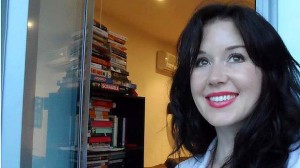Food For Thought is a public theology & Bible advocacy blog for Eternity from Sophia Think Tank’s David Wilson, who gathers top Christian thinkers to take a closer look at how the Christian faith addresses matters in society at large every week.
One of the main stories to flood all forms of media in the past week has been the disappearance and subsequent death of Victorian ABC staffer Jill Meagher. Jill had been drinking with friends and work colleagues after work on Friday night. She left to walk home to her nearby apartment at about 1.30am Saturday morning and disappeared on the way. CCTV coverage showed a man talking to her and some good police work led to an arrest, the discovery of Jill’s body, and then a charge of rape and murder. It’s a shocking story by any account and one that musters up a lot of emotion as we become a part of the story of a life taken much too early and in horrific circumstances.
A few issues are raised by this story that need to be addressed. The problem of violence and the abuse of power; the frightening recognition of the fragility of life and how vulnerable we all are; the overwhelming outpouring of compassion and empathy that shows the best of what community can offer; the role of social media–both positive and negative–in crimes such as this. Each one of these issues could be addressed separately in great detail. I want to simply comment on the way through…
To think that a person can walk home from a local pub in a very public area and be sexually assaulted and murdered puts the fear up all of us. Most murders are committed by people closest to the victim and most of those perpetrators are the victim’s partner. When we hear of this sort of thing we want to jump to the conclusion that it was the victim’s partner because that makes us somehow feel safer. The mixture of violence, power, and randomness makes us feel our vulnerability and we don’t like that. We like to feel we are in control and as long as we do x, y, and z we will be OK. But this sort of seemingly random opportunistic attack undermines such a feeling of powerfulness and control. We feel unsafe in a city we thought was safe.

A march against violence in Melbourne over the weekend saw thousands of people on the streets for Jill Meagher. Image: Sophie Gyles
How does the Bible speak into these issues? The book of Deuteronomy tells of God’s longings for Cities of wellbeing. Throughout its chapters there are themes of people caring for each other, especially the more vulnerable members of the community, and for a well-functioning city at its organisational level. Then the Prophet Isaiah (chapter 65) calls for a city where children are safe, older people are respected, everyone is looked after in their most basic needs and there is enough meaningful employment to go around. I think that the 30,000 people marching down Sydney Road in Melbourne on Sunday would heartily agree. We all long for our cities to be safe havens. God does too according to these writings.
The anger against the accused in the Jill Meagher story, expressed graphically in various forms is in part tapping into the sorrow that God has in relation to those who dare to transgress and make our cities unsafe. But, another theme that exists in the book of Deuteronomy is that perpetrators deserve justice. The establishment of what was known as ‘Cities of Refuge’ was that alleged perpetrators would be kept safe until they had a chance of a fair trial. Our community needs to be aware of this in the case of Jill Meagher and listen to the calls for restraint coming from the Police and from Jill’s family.
Once again we see that the Bible is relevant in our contemporary setting, speaking its wisdom clearly into these situations and resonating with the longings of the community at large. However, one last point for now. The Bible is frequent in its call to self-examination. This is so for a community as well as for individuals. One very uncomfortable question has to be what we as a society are doing and not doing to create a community that at times is unsafe and uncaring and unjust. We all own responsibility to make our world a better place.
Food for Thought.
Email This Story
Why not send this to a friend?




